“Even a Man Who is Pure at Heart” by T. A is a meaningful poetic piece. It begins with a symbolic note when the writer says that even the purest, holy, and pious men may become wild during the full moon. He advised his audience to avoid such kind of dangerous men that possess grizzled in their hearts.
The writer further stated that purity does not stop people from avoiding their wild obsessions. To support his idea, he says that many holy men start wars with a notion of righteous virtue. Following their instincts, they kill many innocent people. They slaughter men and women to fulfill their desires. Also, they enslave their children to strengthen their empire.
As the poem continues, the writer says that if the only full moon could show us evil faces, we would kill them instantly. But, unfortunately, evil lies in oneself. No one can reach the evilness of any man unless he starts showing his sinful nature. Toward the end, the tone of the poem becomes suggestive. The writer says that if we find someone worthy of our wrath, we should try to follow the true path, avoiding any sort of conflict.
Major Themes in “Even a Man Who is Pure at Heart”
Man’s nature, good versus evil, and situational irony are the major themes of “Even a Man Who is Pure at Heart”. The writer starts this poem while displaying the duality of man’s nature. He states that even god-fearing people become wild animals when the moon is full. In other words, power corrupts even the good hearts. As soon as they realize their strength, they keep aside the mask of goodness. And adopt evil ways to follow their obsessions. Therefore, one should always look around to find such cunning people, who seem pure. But in reality, they wait for the right time to exercise their unfair practices.
Furthermore, the writer argues that many good people brought ruination to the earth through wars, fights, and politics. Although their version of such practices is noble, the violence, injustices, and prejudice wars bring are unjustifiable. They slaughter their sisters and brothers, following their evil desires. Also, they enslave innocent children of the gone spirits to build their lasting empire.
Moreover, the writer says that if the only full moon is a way to find such barbarous men. Then, it is easy to kill them to avoid further destruction. Therefore, associating wildness and wickedness with the full moon is not correct. We are always surrounded by evil people who may seem good and well-wisher. But inside, they make plans to destroy their fellow being to gain power and strength.
The writer unfolds a profound message that we should not blindly follow the myths through this simple text. Instead, one should try to find the reality with his eyes open every time. While doing so, we can avoid many conflicts and would be able to save ourselves from the wrong people.
Analysis of Literary and Poetic Devices Used in “Even a Man Who is Pure at Heart”
Although the poem, “Even a Man Who is Pure at Heart” is simple and easy to understand, the writer has inserted many literary and poetic elements in the poem. He has used symbolism, irony, captivating imagery, metaphors, and allegory to explain his ideas about man’s evil and lusty nature.
Irony
The poem begins with an ironic expression, the speaker states how man flips his good virtues when it comes to fulfilling his desires. By using situational irony in the beginning, the writer exposes humankind’s fundamental nature, which is a mix of good and bad virtue. When a man is powerless, he pretends to be humble and virtuous. However, as soon as he gains some power, his good qualities instantly vanish, and he starts following his suppressed desires.
Imagery
Another important literary element that the writer has used throughout the poem is imagery. He has skillfully inserted powerful diction that creates mental pictures and helps the readers grab the underlying meaning of the poem. Images like “grizzled hearts,” “slaughter their sisters and brothers,” and “reveal terror lurking near” beautifully connect readers to his ideas.
Metaphor
Moreover, the writer has also used evilness as an extended metaphor in the poem to show the duality in human nature. No matter how hard we try to hide our evil instincts, there comes a day when everything is exposed to the world. To him, man can suppress his wicked desires for some time, but he cannot get rid of them. On the contrary, he loves to fulfill them when he comes to power.
Symbolism
Besides these elements, the writer has also used symbols like lust, slavery, and murder good versus evil to show how these things run parallel in the world. Therefore, one should not trust people blindly and should try to save himself from the dangers lurking around.
Also Read: kindness by Naomi Shihab Nye

